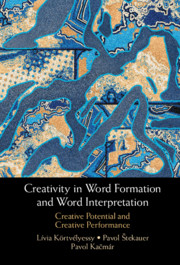Book contents
- Creativity in Word Formation and Word Interpretation
- Creativity in Word Formation and Word Interpretation
- Copyright page
- Contents
- Figures
- Tables
- Acknowledgements
- 1 Introduction
- 2 On the Notion of Creativity
- 3 Theoretical Foundations of Our Research
- 4 Methodological Principles
- 5 Research
- 6 Conclusions
- References
- Author Index
- Subject Index
1 - Introduction
Published online by Cambridge University Press: 20 January 2022
- Creativity in Word Formation and Word Interpretation
- Creativity in Word Formation and Word Interpretation
- Copyright page
- Contents
- Figures
- Tables
- Acknowledgements
- 1 Introduction
- 2 On the Notion of Creativity
- 3 Theoretical Foundations of Our Research
- 4 Methodological Principles
- 5 Research
- 6 Conclusions
- References
- Author Index
- Subject Index
Summary
This book presents interdisciplinary research that lies on the crossroads of (a) psychology, specifically, its concept of the creative potential represented by six creativity scores, viz. Originality, Fluency, Flexibility, Elaboration, Creative Strengths and Composite Score, and the concept of creative performance; (b) linguistics, specifically, word-formation focused on the dynamic aspect of the formation of new complex words based on an onomasiological theory; (c) psycholinguistics, represented by a theory of the meaning predictability of potential/new complex words; and (d) sociolinguistics, in particular, the role of age and gender in the formation and interpretation of complex words. These interrelated areas indicate the complexity of the present research and the complexity of relations between the examined variables. This intricate complexity, however, is aimed to be productive rather than destructive, because this book provides both a theoretical account of the word-formation and word-interpretation creativity and an empirical framework with the corresponding results obtained from more than 700 participants.
Keywords
- Type
- Chapter
- Information
- Creativity in Word Formation and Word InterpretationCreative Potential and Creative Performance, pp. 1 - 8Publisher: Cambridge University PressPrint publication year: 2022

